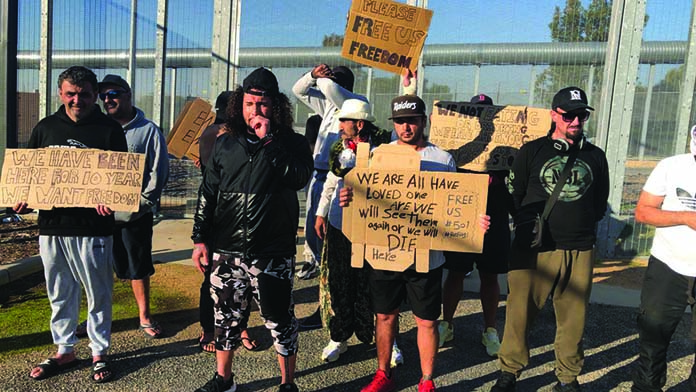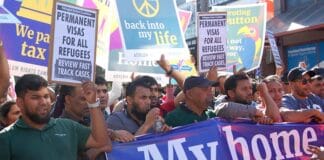When Labor was elected, expectations were high that it would act quickly to rectify the years of abuse inflicted on asylum-seekers and refugees by the Coalition. Immigration Minister Andrew Giles said many times that Labor is committed to “risk-based immigration detention policies” and that “people should be living in the community if they do not pose a risk”.
Now, a year later, protests have returned to immigration detention. Daily protests at Yongah Hill detention centre in Perth have taken place since the beginning of May as patience with the Labor government has run out.
Every afternoon dozens of detainees, some detained for up to ten years, gather to voice their demand to end indefinite detention.
At the end of April, a protest erupted in Melbourne’s MITA detention centre, with fires being set and three detainees taking to the roof of Erskine compound to highlight the habitual mistreatment by Serco and Border Force—and the length of detention.
In another sign of the unrest in immigration detention, “Mahdi” (not his real name), an Iranian refugee in MITA, has been on hunger strike since early May, one of the most serious protests in recent years. Mahdi spent just four months in prison but has been in immigration detention as a “501” since then, more than six years. Unable to be deported to Iran, he is effectively facing a life sentence.
A stateless man, Said Imasi, was only released from Villawood in May after 13 years in detention, after teal MP Allegra Spender took up his case.
Torture
The shameful situation has drawn the recently appointed UN special rapporteur on torture, Alice Edwards, to call on the Australian government to end indefinite detention.
Edwards told The Sydney Morning Herald, “It’s important to note in 1992 it was the former Labor government that introduced indefinite detention of refugees and asylum-seekers. It was extended by the Liberal and Coalition government, but now I’m appealing to the new government.”
Edwards said that when individuals spent more than three months in detention “without an end in sight” their treatment could begin to be classified as “degrading, inhumane or psychological torture”.
On that measure, torture is a defining characteristic of Australia’s immigration detention centres. Recent Home Affairs figures show that the average time in immigration detention has blown out to 780 days, more than two years. Some 130 people have been held in detention five years or longer.
Some 190 people held in detention centres are from Afghanistan, Sudan or Iran. With on-going war and repression in those countries, there is no possibility of any of them being returned. Yet, they too are held in indefinite detention.
A year since the election, it has very clear that Labor is not committed to making substantial changes to the Coalition’s refugee policies.
The May Senate Estimates hearing was told that the government’s direction is “to reduce the [Nauru refugee] population to zero”. Yet Labor has confirmed the $485 million contract for the notorious US company, MTC, for “garrison services” on Nauru (future asylum boat arrivals will still be sent offshore) although there are fewer than 30 refugees there, almost all scheduled to be resettled in Canada.
Labor announced in February that 19,000 refugees on Temporary Protection Visas or Safe Haven Enterprise Visas could apply for permanent visas.
Although refugees have been forced to live on temporary visas without their families for ten years, the transfer to permanent visas is painfully slow. Fewer than 2000 have been granted, although Labor said all would be finalised within a year.
Despite Labor’s promised policy, it has not actually abolished TPVs and SHEVs, meaning that any new boat arrival, if they were processed in Australia, would be eligible only for a temporary visa.
Wednesday 19 July will mark ten years since the then Rudd Labor government introduced the Pacific Solution Mark II and declared no asylum-seeker sent to Nauru or PNG would ever be resettled in Australia. Protests are planned across the country to mark the infamous anniversary and demand the Albanese government ends offshore and indefinite detention.
By Ian Rintoul






